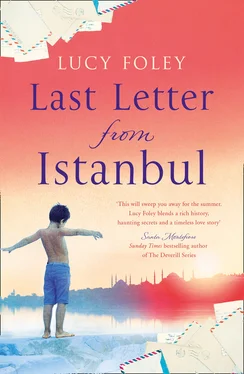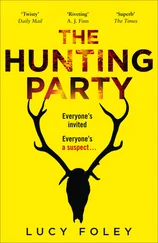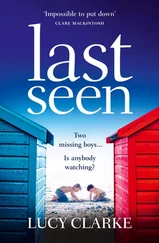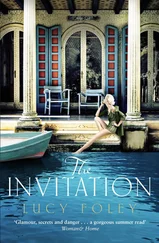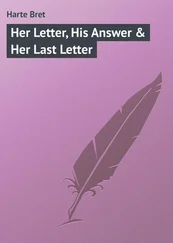Her mind fills with fantasies. She sees herself lunging toward him as he moved aside for her on the jetty. Pushing out with both hands … him toppling backward into the Bosphorus. His imagined surprise is a delicious thing; the indignity of his fall.
She could have run back toward the ferry … before he or that invalid had time to act.
She catches herself. She knows that she could never have done it. Her mother and grandmother, the boy, the school: there is simply too much at stake. Still, it cannot hurt to imagine. The realm of fantasy, at least, is one that cannot be occupied.
Medical Officer George Monroe watches the woman leave, picking her way along the path – surprisingly sure-footed in her long skirts. She seems a melancholy figure, but this may be nothing more than the effect of the dark clothing, and the way she holds herself against the breeze from the water.
‘Touched in the head,’ Rawlings says, authoritatively, ‘if you ask me. Found her looking as though she were about to throw herself into the Bosphorus.’
This seems a little rich coming from the man who, in the grip of a fever, asked George to bring him ‘a glass of the tawny ’05. Generously poured. And tell Smythson I’d like my usual spot by the fire.’
George feels that, actually, she had seemed as sane as any of them. With the Allied officers all gone a little wild from the heat and new freedoms and too long spent away from home, the locals sometimes seem the only ones with some connection to reality; getting on with the business of their lives.
But what on earth was she doing here?
He was not convinced by her explanation; he suspects that she is not someone used to lying. He entertains briefly, and dismisses, the idea of sabotage or espionage. A less threatening figure – a woman bathing her feet, for goodness’ sake – he cannot imagine.
A week ago. He had just been to the barber, making his way back through the streets toward the bridge. One of the figures coming toward him had been moving faster than the rest; his eye had followed it instinctively. And then, as he saw her clearly, with curiosity. There are far fewer women than men on the streets, for one thing, and this one was running. Attempting to, at least – hampered by long skirts, the cobblestones, a teetering pile of books. He watched, half-amused, half-intrigued and also with a wincing certainty that calamity was about to follow.
He had seen something fall.
When he had handed her the book she had looked at him with something close to hatred. Despite himself, he had rather respected her for it.
How odd to see the same woman twice in the space of a week … in this vast city. Yet he is beginning to understand that there are recurring motifs within this place, encounters that, at times, can make it feel more like a village. Some of the faces within it are already familiar to him: the sellers of mackerel sandwiches along the quay, the men who man the ferries, a certain French officer who seems to have the same taste for Turkish coffee as he.
He is not a superstitious man – his only belief is in the essential chaos of things. And yet he feels oddly certain that he will see her again.
The new site for the British military hospital in Constantinople is not the most convenient, but it is a peaceful spot, and will prove useful if there is a need for quarantine. It is not really part of the city at all – the wild sprawl of trees and bush behind the grounds seem desperate to swallow it and reacquaint themselves with the water. It was a case of needs must, however. A large, well-ventilated space was required, and this house was what was available: requisitioned from the Turkish authorities. Besides, it is a vast improvement upon a tent in the desert: those months during the Mesapotamian campaign. Where new flies clustered in wounds even as you swept the old ones away. Where temperatures rose to unholy, unbearable levels, even beneath the canvas, and where with no warning a gust of sand might blow in to cover everything, riming the nostrils and open mouths of men too ill to be sensible of the indignity of the invasion.
All his initial reservations about the position of the house – not built for the purpose, too far from the centre to be practical – faded at the sight of it. It is the loveliest building he thinks he has seen on the Bosphorus. It is not the largest, nor is it the most ornate. But there is a matchless elegance in the situation, in the graceful white poise of it, the dark, melancholy cypresses rising about it as though shielding it.
He has wondered how it came to be vacant. On first setting foot inside he had the uneasy impression that the former occupant had only just left – that he might return at any instant for something forgotten. There was a fine dust over everything, a pall of it hanging in the air. Evidently, it had not been occupied for some time. But much seemed to have been left, in the careless manner of one who did not know he was departing for good. Here, everywhere, were tokens of a life lived in all its chaos and elegance. In lanterns sat the half-burned stumps of candles; a heavy painted vase contained the brown exoskeletons of hyacinth blossoms. An encircling garden in which the work of a human hand is still evident: jasmine trained along a painted trellis, just beginning to run wild, shrub roses in crescent-shaped borders, a vegetable garden where huge yellow squashes rot uselessly and monstrous asparagus ferns dance in the breeze. From the bough of one of the fig trees hangs a swing seat. And centre of it all, the monarch to the court, is a grand old pomegranate tree. Most of the fruits have been split open by the birds or by the sheer force of their open unplucked ripeness. A few remaining seeds glisten within, promising a late treasure.
On the first day, when he was overseeing the placement of the hospital beds, he was certain that he could detect the sound of an infant crying outside: a thin wail, rising and falling. Unnerved by the sound, he followed it into the garden and discovered the seat creaking mournfully back and forth on its hinges in the wind. Almost as though – an uncanny thought – someone had only just vacated it.
George is a pragmatist, an atheist. Yet he found himself unable to quash the idea of spirits left behind.
The ward has been set up in the largest room: painted pistachio-green and hung with still life scenes: dusky grapes spilling from a platter; fat peaches with the delicate fur gorgeously rendered. They make the mouth water. There were times in the Mesapotamian desert when he would dream of fresh things like these – though his dreams were perhaps more humble. A head of lettuce. Taking the whole thing in his hands, biting into it as one might an apple and feeling it cold and wet on his tongue: the antithesis of all the desert was. If he could have this one experience, he felt, he could put up with any number of deprivations.
This room has a feminine feel to it: the colours, maybe. He knows little about Ottoman life, but has learned this one thing: that in many houses, grand or meagre, there is often an area reserved exclusively for the use of the women. A sense of trespass. He knows that if he were able to vocalise this sensation he would be laughed at. This is the way of things, how it has been since the dawn of man. There is no such thing as trespass for the victorious. All before them, conquered, has become their own. To say otherwise would be almost a form of treason.
In the streets his attire makes him indistinguishable from the rest, for better or worse. He has seen how the people here react to the different uniforms, that they respond worst of all to British khaki. There are liberties taken. But some soldiers, many, regard this as only their right.
Is it not the worst sort of shame, to be ashamed of one’s own people?
Читать дальше
